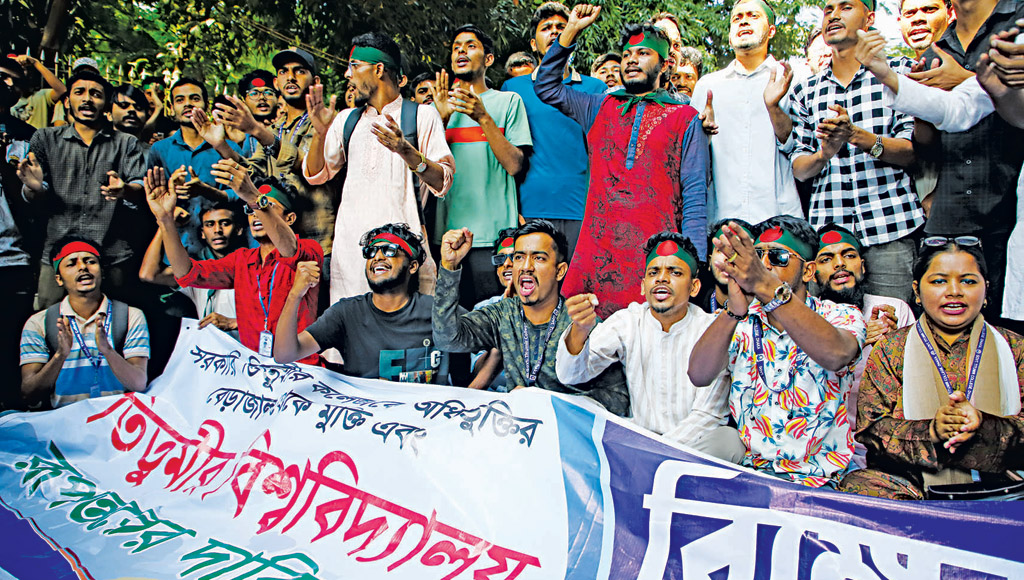
Normal academic atmosphere in tertiary-level educational institutions is yet to be restored in the country even after almost 11 months of the student-led mass uprising in July and August in 2024.
The disruption in the academic atmosphere started before the student movement due to boycotting classes by the teachers and normalcy did not return in the tertiary level institutions even after major overhauling in different positions of the institutions.
During this period, students from the public universities to the private ones and from colleges to different polytechnic and nursing institutes continued to protest to realise their different demands.
Their frequent protests, including blocking roads, highways and rail lines and besieging the secretariat and different police stations, also caused huge public sufferings.
Amid prolonged closures and protests at different institutions, session congestion is also feared.
Removals of the heads of the institutions, including vice-chancellors, also affected both academic and administrative activities in these institutions.
Blaming the lack of academic leadership, senior academicians said that the heads of the institutions and the teachers should take responsibility for restoring the academic atmosphere.
Dhaka University emeritus professor AF Serajul Islam Choudhury said that the incidents that took place after the July-August movement were very unnecessary and damaging.
‘It will be very difficult to cover this damage,’ he said and added that students lost a year after the Liberation war in 1971 and the same situation was created again after the 2024 mass uprising.
‘It is not acceptable at all,’ he said.
University Grants Commission chairman professor SMA Faiz told New Age on Sunday that new vice-chancellors were appointed at all public universities after the movement but some of them could not fulfill the expectation of restoring the academic atmosphere.
Protests are now going on at Dhaka University, Khulna University of Engineering and Technology, National University, seven colleges formally affiliated with Dhaka University, polytechnic institutes and different nursing institutes in the country.
The students of Dhaka University are now continuing protest for the fifth consecutive day on Sunday after the death of Shahriar Alam Shammo, a DU student and a leader of the DU unit of Jatiyatabadi Chhatra Dal, in an attack by a group of miscreants in the Suhrawardy Udyan area on May 13.
A group of students besieged the Shahbagh police station for the second day on Sunday and the leaders and activists of JCD blocked the Shahbagh crossing area for around two hours on the day.
The standstill situation in the KUET campus lingered for the straight 89 days on the day as all academic activities at the university were suspended between February 19 and May 18 following a violent clash between Jatiyatabadi Chhatra Dal and the Students Against Discrimination on February 18 over banning on-campus student politics.
Following the student protests, the education ministry removed KUET vice-chancellor Professor Mohammad Mashud and pro-vice-chancellor Professor Sheikh Shariful Alam from their posts on April 25 over allegations of failing to ensure the safety of the students.
The government on May 1 appointed a new vice-chancellor for the university.
The classes at KUET were scheduled to resume on May 4 but the teachers refused to conduct classes till Sunday protesting at assaults on them.
UGC chairman professor SMA Faiz said that the vice-chancellors and the teachers should play strong roles in restoring academic atmosphere in the universities by solving the problems.
The students should also play their role in this regard, he said.
‘We should not cross the limit while demanding the right things,’ he added.
Emeritus professor Serajul Islam Choudhury blamed the absence of academic leadership for such a situation.
‘Every university has a teachers’ association which should retrieve the academic atmosphere in the university but they are not doing that work,’ he said, adding, ‘they are still partisan and negligent to their duties.’
Serajul said that the interim government was not organised and added that the government would not be able to restore the normal academic environment without the help of the teachers.
On July 1, 2024, the students of public universities across the country started a protest demanding reform in the quota system for government jobs.
On the same day, public university teachers across the country started an indefinite work abstention programme by boycotting classes and examinations demanding the cancellation of the universal pension scheme titled Prattay, which the then regime later ditched.
The student-led quota movement soon turned into a mass uprising by claiming the lives of at least 834 people and culminated in the ouster of the Sheikh Hasina-led Awami League regime on August 5, 2024.
Soon after the ouster of the Hasina-led regime, many vice-chancellors stepped down simultaneously in an unprecedented scenario amid the allegation of heavy politicisation of the universities, especially in the past 15 years of the Awami League regime.
Following the fall of the Awami League regime, pro vice-chancellors, registrars, treasurers, proctors, deans, provosts, syndicate members, wardens and house tutors also resigned in many universities.
As many as 70 or more officials resigned at one go at some universities.
According to the UGC, the country has now a total of 55 public universities.
After the movement, the UGC reappointed vice-chancellors and pro vice-chancellors of all these universities.
Academic activities at all public universities resumed within four months of the movement.
In October 2024, the students of seven colleges in Dhaka, then affiliated with DU, launched a large movement blocking the Nilkhet and the Science Laboratory crossing areas and causing huge public suffering.
In November 2024, one of the colleges, Government Titumir College, blocked roads and rail lines in Dhaka demanding a separate university for them.
These colleges are still continuing their protests to press home their demands.
Polytechnic students began their countrywide demonstrations on April 16 by blocking roads, highways and rail tracks.
They are still continuing their protests.
In May this year, nursing students staged demonstrations in districts including Dhaka, Rajshahi and Rangpur by blocking major crossings in the capital and some highways demanding the recognition of the diplomas in nursing and midwifery as equivalent to bachelor’s degree.
The government on May 13 relieved Barishal University’s vice-chancellor Professor Shuchita Sharmin, pro-vice-chancellor Professor Golam Rabbani and treasurer Professor Mamunur Rashid from their duties amid student protests demanding their removal over alleged mismanagement and lack of transparency committed in running the university.
On May 14, several hundred Jagannath University students and teachers in Dhaka held a ‘Long March to Jamuna’, to press their three-point demand including an end to the residential crisis. At least 50 teachers and students of JnU were injured in police action on the day when the police intercepted the march to disperse the protesters at the Kakrail Mosque police barricade.
The protesters then began a sit-in in front of the police barricade and continued it until May 16.
A section of the students and teachers of National University is now holding protests against the government’s decision to close the university’s all enrolment activities for honours programmes on the main campus.





